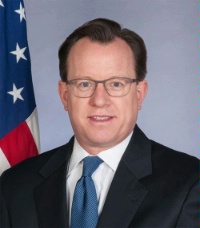
12 September 2017 – The United States Senate Committee on Foreign Relations (SFRC) this morning held a hearing to consider the nomination of Justin Hicks Siberell to be the new Ambassador to Bahrain. While it remains deeply concerning that the Trump Administration, SFRC Chairman Senator Bob Corker (R-TN), and now the nominee to serve as America’s top diplomat in Manama all continue to support the decision to remove reform conditions from major arms sales to the Bahraini military, Americans for Democracy & Human Rights in Bahrain (ADHRB) commends Mr. Siberell for controverting previous State Department policy to deemphasize human rights in the US-Bahrain bilateral relationship.
Mr. Siberell, a career diplomat who previously served as Acting Coordinator for Counterterrorism the State Department’s Bureau of Counterterrorism and Countering Violent Extremism (CT), provided introductory testimony at today’s hearing and received verbal questions from Senators Ben Cardin (D-MD), Jeanne Shaheen (D-NH), Tim Kaine (D-VA), and Chris Coons (D-DE). Both the nominee’s remarks and the senators’ questions focused predominantly on the interaction between US human rights and security interests in Bahrain.
In his statement, Mr. Siberell endorsed the Trump Administration’s decision to lift human rights conditions intended to serve as reform incentives on a major arms sale to the Bahraini military, claiming that “defense sales…will address critical needs in the Bahrain Defence Force’s air, land and naval capabilities, including the sale of new F-16 aircraft and upgrades to previously purchased F-16s… [providing] Bahrain with a reliable capability and increased interoperability with US forces.” Signaling reduced pressure from Washington and an abandonment of key leverage to encourage progress, this shift has already had severe consequences on the ground in Bahrain, with the kingdom’s deadliest raid on a peaceful protest in decades occurring just days after President Donald Trump discussed deepening cooperation with King Hamad bin Isa al-Khalifa in May.
Echoing these concerns, Senator Shaheen asked the nominee to expound on his support for US arms transfers – and specifically the previously conditioned F-16 sale – to Bahrain. Mr. Siberell’s reply, while supporting the Trump Administration’s broader goal to increase assistance to the Bahrain Defence Force (BDF), diverged from recent comments issued by the State Department suggesting a marked de-emphasis of human rights in US policy toward the kingdom. Just two months ago, on 13 July 2017, the Acting Assistant Secretary for the Bureau of Near Eastern Affairs, Stuart Jones, told the House Foreign Affairs Committee that “this administration has de-linked…human rights from our security support.” Mr. Siberell, conversely, suggested that security and human rights are mutually reinforcing: “[The US must] never step away from our obligations to continue to hold very open and serious dialogue with the Government of Bahrain about conditions inside country, to include the promotion and protection of human rights…The linking directly of military sales…to the human rights issues – those just need to be brought together in a broad-based conversation with the Bahraini government.” He additionally confirmed that holds on arms and equipment related to “crowd control and internal security” – which typically apply to the Bahrain Ministry of Interior police forces, excluding the Coast Guard – “remain in place.”
In response to follow-up questions from Senators Kaine and Coons, in which they asserted that Bahrain cannot use security concerns as an excuse to discriminate against the Shia majority community, ban opposition groups, and jail human rights defenders like Nabeel Rajab, Mr. Siberell went further, stating: “Effective channels for political discourse…are critical to ensuring essential stability upon which our partnership must rest and ultimately for the stability and strength of the Bahraini state and its relationship with its people…There need [not be] a contradiction between promotion and protection of human rights…and effective security practices which protect the population, and that is a point I will continue to emphasize if given the opportunity if confirmed as Ambassador to Bahrain, that we need to bring these two together – that to conflate legitimate political speech with terrorism is to potentially cut off channels for the kind of discourse that is required ultimately for a healthy and stable society.” Mr. Siberell’s reply drew on his written statement, wherein he pledged to monitor Bahrain’s 2018 elections and stressed that the kingdom’s long-term stability depends on political reconciliation.
“It is encouraging to hear the nominee for Ambassador to Bahrain walk back some of the most troubling comments we’ve seen from the State Department in recent months and to recognize that the Bahraini government’s deliberate conflation of peaceful opposition and activism with terrorism is deeply detrimental to the kingdom’s security and stability,” said Husain Abdulla, ADHRB’s Executive Director. “Unfortunately, Mr. Siberell – like Senator Corker – seems unwilling to fully acknowledge that completely unconditional support for the military, which is itself implicated in discrimination and abuse, muddles Washington’s message and ultimately undermines the stability and efficacy of the security partnership. Once in Manama, he must take all possible steps to ensure those arms and any other US assistance does not further entrench the government’s repressive measures.”
With questions for the record open for the remaining senators until Thursday, ADHRB urges Mr. Siberell to thoroughly respond to all outstanding questions and, should he be confirmed, we call on him to follow through on his stated commitment to pursue human rights reform as an equal and integral part of US policy to encourage a secure and stable Bahrain.





